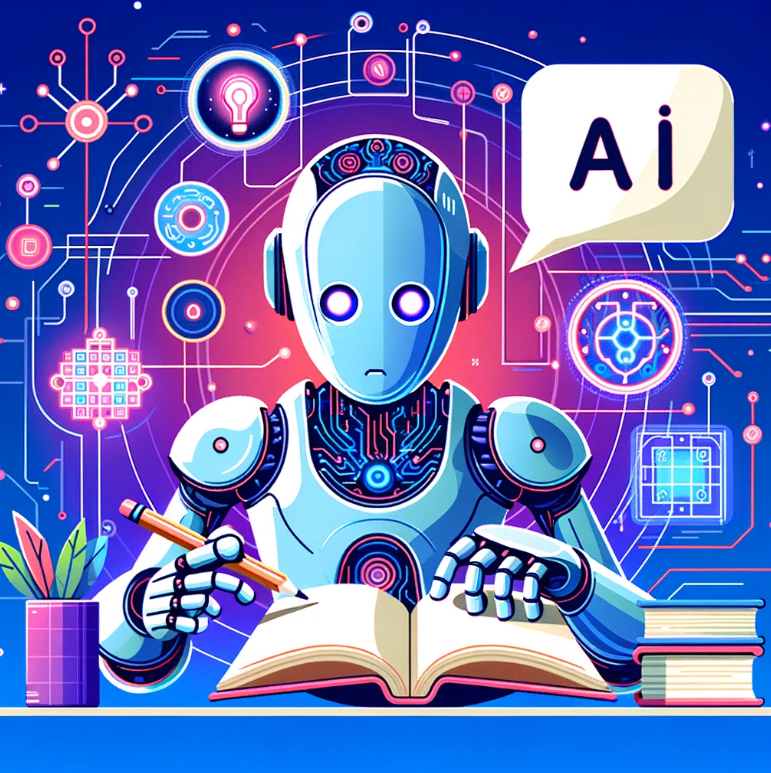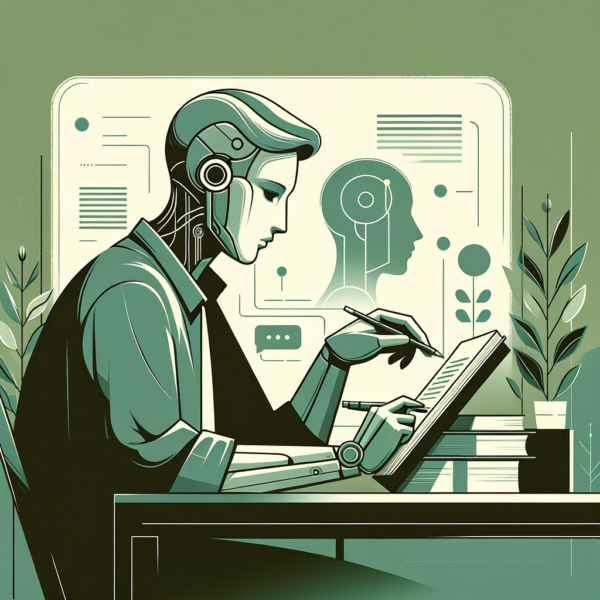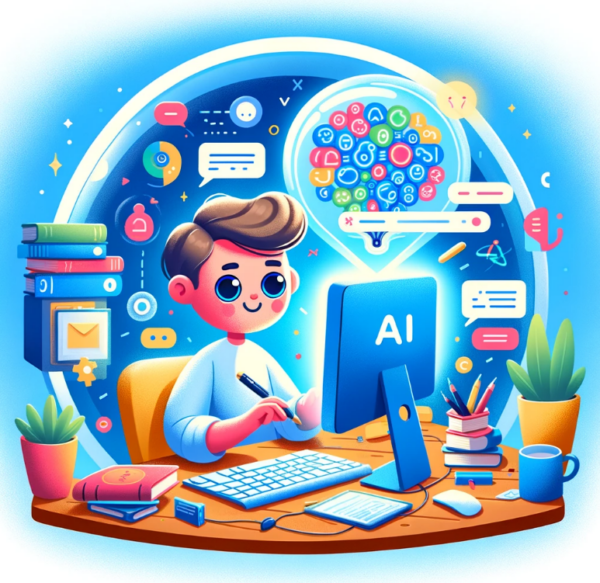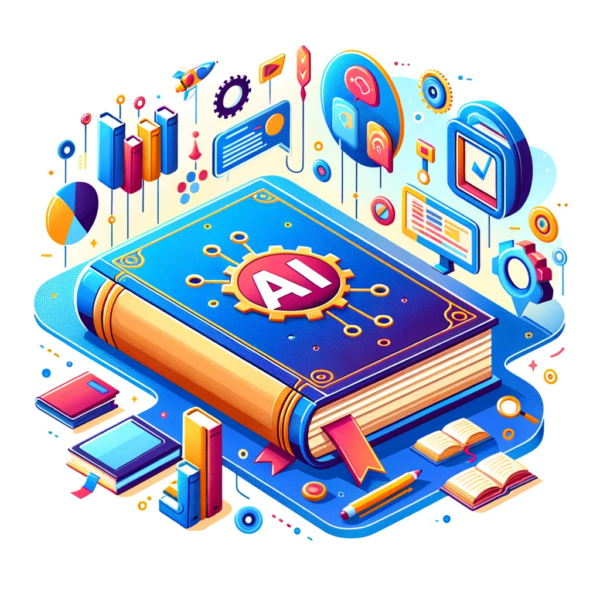The publishing industry has recently undergone a significant transformation due to rapid digital innovation. This shift to digital has changed the way content is created, distributed, and consumed.
Now, Artificial Intelligence (AI) is emerging as a key player, poised to further revolutionize the field. AI is reshaping publishing through algorithm-driven content curation, AI-assisted writing, and editing, offering new possibilities for personalized content and data analysis. This transformation is a clear indicator of ‘AI and the Future of Publishing’.
This article aims to investigate the extensive impact of AI on both digital and traditional publishing. We’ll assess the opportunities and challenges AI brings, including ethical concerns and the need for human creativity. Ultimately, this blog post will highlight AI’s role in the evolving narrative of publishing, showcasing its potential to transform how knowledge and stories are shared.

The Evolution of the Publishing Industry: From Print to Digital
The journey of the book publishing industry from print to digital is a testament to the dynamic nature of technological evolution. The traditional print era, dominated by the tactile presence of paper and ink, was characterized by physical bookstores, libraries, and a more localized reach.
However, with the advent of the internet and digital transformation, a seismic shift occurred. The introduction of e-books and online platforms began a revolution that transformed every aspect of publishing.
This digital transformation mirrored broader societal changes. As people increasingly embraced digital devices for information and entertainment, publishing had to adapt.
The first major milestone was the emergence of e-readers and e-books, which offered readers unprecedented convenience and accessibility. Digital capabilities have allowed for wider distribution, overcoming geographical barriers and drastically reducing the costs associated with print production and distribution.
Your Publishing Journey Awaits – Start NowCurrent Trends in Digital Publishing
Today, digital book publishing encompasses much more than just e-books. Online platforms have expanded to include multimedia content like audiobooks, interactive media, and digital magazines.
Educational publishing has particularly benefited from this shift. Digital textbooks, online courses, and educational apps have emerged, offering interactive and personalized learning experiences.
Moreover, the rise of self-publishing platforms has democratized content creation, allowing independent authors and small publishers to reach global audiences without the need for traditional publishing gateways. This trend has led to an explosion of content, catering to a vast range of interests and niches.
Technology has been the driving force behind this digital transformation. Advancements in digital distribution, marketing analytics, and audience engagement tools have provided publishers with new ways to reach and understand their readers.
Social media and digital marketing have become integral to book promotions, helping to create vibrant online communities around authors and genres.
The digital transformation has also brought challenges, particularly in adapting to the rapid pace of change and in managing the deluge of content. However, the overall trajectory has been one of expansion and innovation, setting the stage for the next leap in publishing: the integration of Artificial Intelligence.

Artificial Intelligence: Defining the New Age
Artificial Intelligence (AI) refers to the simulation of human intelligence in machines programmed to think and learn like an actual human.
AI systems can perform tasks that typically require human intelligence, such as visual perception, speech recognition, decision-making, writing, and language translation.
Generative AI, a subset of AI, focuses on creating new content, whether it be text, images, or even music. It learns from existing data and can generate original outputs that are coherent and contextually relevant. This aspect of AI has profound implications for content creation in publishing.
The Concept of AI as a Tool and Its Potential as a ‘Next Generation’ Technology
AI is not just another new technology; it’s a tool that represents a fundamental shift in how we approach problem-solving and innovation.
Its ability to process and analyze vast amounts of data far exceeds human capabilities. This makes AI a potent tool for uncovering patterns and insights that can drive new strategies and innovations.
As a next-generation technology, AI has the potential to automate routine tasks, augment human capabilities, and create entirely new methods of content creation and distribution.
In publishing, this could mean AI-driven editorial tools, such as Spines, personalized reading experiences, and dynamic content adaptation.
AI’s role in the future of publishing is not just as a facilitator but as a catalyst for transformation, opening doors to possibilities that are only just beginning to be explored.
AI and the Future of Publishing
The integration of Artificial Intelligence (AI) into publishing heralds a future where the boundaries of content creation and distribution are continually expanding.
AI’s influence extends across all facets of publishing, from automated content generation to sophisticated user analytics.
This technology is not just streamlining existing processes; it’s enabling publishers to explore new creative territories and redefine their relationship with readers.
One of the most significant advancements is in AI-generated content. Tools capable of producing written material have raised questions about quality and originality.
While AI can efficiently generate articles, reports, and even narrative content, worries about maintaining the authenticity and emotional depth that human writers bring are paramount.
Ethical considerations, such as authorship rights and transparency about AI’s role in content creation, are increasingly relevant.
Examples of AI Applications in Publishing
AI technologies have opened the doors to new business models in the world of publishing. Here are some of the AI capabilities that have allowed this:
- Automated Editing and Proofreading: AI algorithms can now assist in editing by detecting grammatical errors, suggesting style improvements, and even ensuring consistency in tone and terminology.
- Personalized Content: AI can analyze reader preferences to tailor content, thus enhancing user engagement and satisfaction. This personalization extends to customized book recommendations and adaptive learning materials in educational publishing.
- Data-Driven Marketing Strategies: AI’s ability to process and analyze consumer data is enabling publishers to develop targeted marketing campaigns. This helps in identifying market trends, reader segments, and effective channels for content promotion.
Despite AI’s efficiency and analytical capabilities, the need for human insight and creativity remains critical. The publishing industry is, at its core, a human-centric field, reliant on storytelling, emotional connection, and intellectual depth.
The challenge lies in finding the right balance between leveraging AI for its efficiencies and maintaining the unique value that human perspective brings to content creation and decision-making.
This balance is crucial for ensuring that AI acts as an augmentative tool, enhancing rather than replacing the human touch in publishing.
In-Depth Analysis of AI’s Influence on Publishing
The integration of Artificial Intelligence (AI) in publishing signals an era where content creation and distribution constantly evolve. AI affects all aspects of publishing, from generating content to sophisticated user analytics.
AI is enhancing existing processes and opening new creative avenues, allowing publishers to reimagine their interactions with readers.
AI’s capability to produce written material has sparked a debate over quality and originality. While AI efficiently generates various contents, there are issues surrounding its ability to replicate the authenticity and depth that human writers offer.
Your Publishing Journey Awaits – Start NowEthical issues, including authorship rights and AI’s role in content creation, are becoming increasingly important. Here are some of the applications of AI in publishing:
- Automated Editing and Proofreading: AI algorithms assist in editing by identifying grammatical errors, suggesting stylistic enhancements, and maintaining consistency in tone.
- Personalized Content: AI tailors content to reader preferences, enhancing engagement and satisfaction. This includes custom book recommendations and adaptive educational materials.
Data-Driven Marketing Strategies: AI processes and analyzes consumer data, helping publishers create targeted marketing campaigns. This leads to a better understanding of market trends and effective content promotion channels.

The Business of AI in Publishing
AI is reshaping not just content creation but also monetization in publishing. New models, such as subscription services, pay-per-article, and dynamic pricing, are emerging. These are facilitated by AI’s ability to analyze market dynamics and reader preferences.
In advertising and marketing, AI’s sophisticated targeting, predictive analytics, and content distribution automation are revolutionizing ad spending and revenue generation. Additionally, AI’s global reach helps publishers access new markets, significantly expanding their audience.
Despite AI’s analytical prowess, the human element remains vital, as the field is deeply rooted in storytelling and emotional connection.
The biggest challenge is balancing AI’s efficiency with the human touch in content creation and decision-making. Maintaining this balance ensures AI enhances rather than replaces human creativity.
AI-Driven Challenges and the Many Opportunities
The integration of AI in publishing brings several challenges:
- Data Privacy: As AI systems require large datasets to learn and make predictions, handling sensitive data raises privacy issues. Publishers must navigate these problems, ensuring compliance with data protection regulations.
- Reliance on AI: Over-reliance on AI can lead to a lack of diversity in content and potentially echo chambers. It’s crucial for publishers to find a balance between AI-driven content and human editorial judgment.
- Maintaining Content Quality: While AI can generate content efficiently, ensuring it’s decent and authentic remains the biggest challenge. Publishers must monitor AI-generated content to maintain editorial standards and authenticity.
Opportunities Presented by AI
- Efficiency in Content Production: AI can automate routine tasks, freeing up human resources for more creative endeavors.
- Enhanced Research and Data Management: AI’s ability to process vast amounts of data can aid in better research, audience understanding, and personalized content creation.
- Navigating the Attention Economy: In an era of information overload, AI can help publishers identify and capture audience attention by analyzing reader preferences and optimizing content delivery.
As we envisage the landscape of publishing in 2030, it is clear that Artificial Intelligence (AI) will be at the forefront of this industry’s evolution. The transformation from print to digital has already set the stage for AI to make significant inroads, reshaping how content is developed, managed, and consumed.
AI, with its capabilities for automated content generation, personalized user experiences, and data-driven strategies, is not just an add-on but a fundamental shift in the publishing paradigm.
The integration of AI brings forth both exhilarating opportunities and formidable challenges. On one hand, AI offers unparalleled efficiency in content production, enhanced research capabilities, and innovative approaches to managing the attention economy.
On the other hand, concerns around data privacy, the risk of over-reliance on AI, and the imperative to maintain content quality and authenticity pose critical challenges.
AI’s impact on self-publishing has democratized the field, empowering individual authors with tools and new technologies that were once the exclusive domain of large publishing houses.
Looking ahead, the success of publishers and authors in this AI-driven future will hinge on their ability to balance the efficiency and insights provided by AI with the irreplaceable value of human creativity and judgment.
This equilibrium will be crucial in harnessing AI’s potential while preserving the core values of publishing – storytelling, intellectual depth, and emotional resonance.
As we embark on this journey towards Vision 2030, the industry stands at a crossroads of tradition and innovation. Embracing AI while honoring the timeless essence of storytelling will be key to thriving in this new era.
The future of publishing, influenced profoundly by AI, promises not just a transformation in how we produce and consume content but also in how we connect with the world of ideas and narratives. In this future, AI is not just a technological tool; it is a catalyst for a new chapter in the rich and evolving story of publishing.








